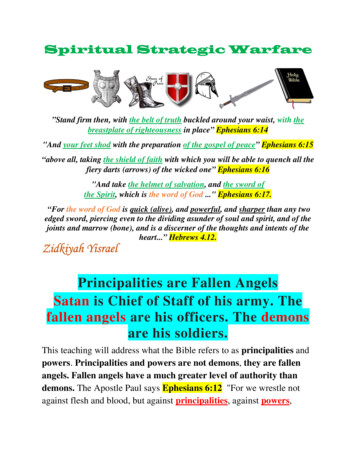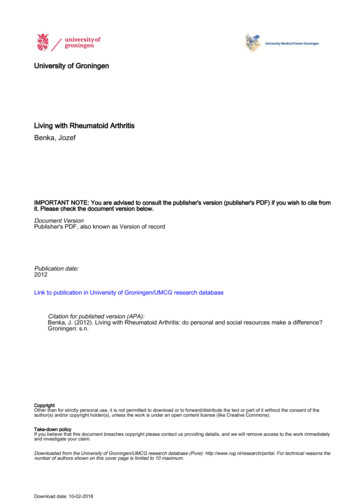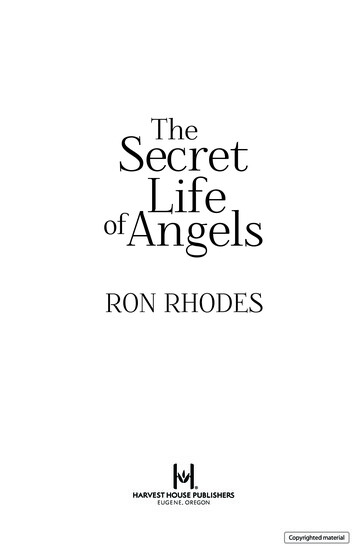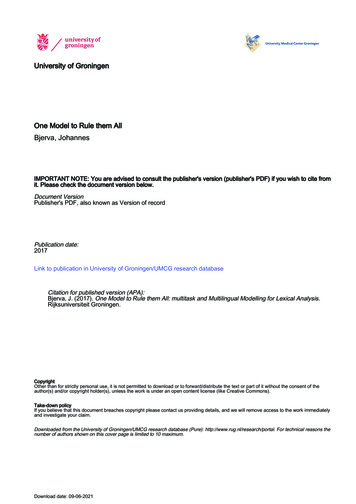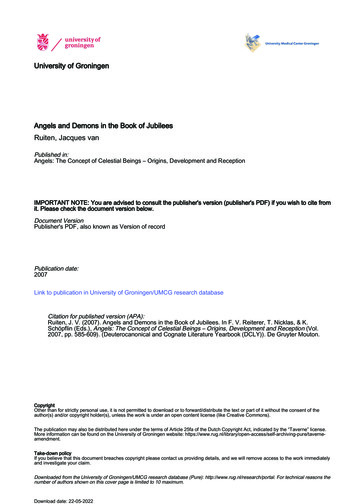
Transcription
University of GroningenAngels and Demons in the Book of JubileesRuiten, Jacques vanPublished in:Angels: The Concept of Celestial Beings – Origins, Development and ReceptionIMPORTANT NOTE: You are advised to consult the publisher's version (publisher's PDF) if you wish to cite fromit. Please check the document version below.Document VersionPublisher's PDF, also known as Version of recordPublication date:2007Link to publication in University of Groningen/UMCG research databaseCitation for published version (APA):Ruiten, J. V. (2007). Angels and Demons in the Book of Jubilees. In F. V. Reiterer, T. Nicklas, & K.Schöpflin (Eds.), Angels: The Concept of Celestial Beings – Origins, Development and Reception (Vol.2007, pp. 585-609). (Deuterocanonical and Cognate Literature Yearbook (DCLY)). De Gruyter Mouton.CopyrightOther than for strictly personal use, it is not permitted to download or to forward/distribute the text or part of it without the consent of theauthor(s) and/or copyright holder(s), unless the work is under an open content license (like Creative Commons).The publication may also be distributed here under the terms of Article 25fa of the Dutch Copyright Act, indicated by the “Taverne” license.More information can be found on the University of Groningen website: ing-pure/taverneamendment.Take-down policyIf you believe that this document breaches copyright please contact us providing details, and we will remove access to the work immediatelyand investigate your claim.Downloaded from the University of Groningen/UMCG research database (Pure): http://www.rug.nl/research/portal. For technical reasons thenumber of authors shown on this cover page is limited to 10 maximum.Download date: 22-05-2022
Angels and Demons in the Book of JubileesThe book of Jubilees is presented as a revelation which Moses receives atMount Sinai.! It actually consists of a rewriting and interpretation of thebiblical narrative from the creation until the arrival of the children ofIsrael at Mount Sinai. Although the text of Jubilees is guided to a largeextent by the biblical books of Genesis and Exodus as far as content andsequence are concerned, one should acknowledge that other sourcesand traditions are also incorporated in the book. One can point to theaddition of material originating from the Enochic traditions (4:15-26;5:1-12;7:20-39;10:1-17),2the Aramaic Document of Levi (e.g., Jub. 31-32),3and 4QVisions of Amram Uub. 46).4 Some scholars opt for a commonsource for 1 Enoch, Jubilees and some Qumran texts (the so-called Book of234According to both external and internal evidence, the book of Jubilees would havebeen written in the middle of the second century B.C.E. Cf. Berger, Buch 298-300;Charles, Book lvii-lxvi; Davenport, Eschatology, 10-18; Nickelsburg, Literature 78;VanderKam, Studies 214-285.See especially VanderKam, Enoch Traditions. This work influenced VanderKam'sGrowth 179-188,and formed the basis of a chapter in VanderKam, Man 110-121.Seealso some of his predecessors: Charles, Book xliv, 36-39, 43-44; Grelot, La It?gende526, 181-210;Milik, Book of Enoch. VanderKam is followed by, e.g., Nickelsburg, 1Enoch 71-76.Grelot and others opt for a dependency of Jubilees on the Testament of Levi. SeeGrelot, Ancien 253-263 (esp. 255); Grelot, Livre 109-131.So also, e.g., Stone, Figures575-586.See also Grelot, Cents 559-570;Puech, Qumran 4.22, 285-286;Drawnel, Wisdom 63-75;Greenfield / Stone / Eshel, Levi Document 19-22;De Jonge, Testament 367385 (esp. 373-376) (reprinted in Jewish Eschatology 244-262).According to Kugler, aso-called "Levi-apocryphon" was the source for both the Aramaic Levi Documentand Jubilees; d. Kugler, Patriarch 138. According to Becker both the Aramaic LeviDocument and Jubilees go back to common oral traditions; d. Becker, Untersuchungen 86.Cf. Milik, 4Q Visions 77-97 (esp. 97); Puech, Qumran 4.22, 285-286,322-324;HalpernAmam, Fathers 135-152(esp. 146-152).
Noah),5 but others speak about the incorporation of other traditionswithin the rendering and explanation of the biblical text, or about afusion and reconciliation of different Jewish streams in the 2nd centuryB.C.E.As far as angels are concerned, the author follows to a certain extent the biblical text. However, he goes beyond the biblical text with hismore elaborate angelology, in which the influence of other sources andtraditions is also apparent. According to Jubilees, there are both goodand evil angels. Whereas humans live on earth, the good angels livetogether with God in heaven. The demons and the angels who sinnedare punished in the depths of the earth.6 However, angels and demonscan also be active on earth. God sent some angels on earthly missions,and some of the demons are allowed to serve their leader, princeMastema, on earth.In this paper, I would like to go into the creation of angels on thefirst day of creation, and into their activities (praising God, keepingsabbath and festivals). I will then deal with the angel of the presence,the most prominent angelic character in the book. Subsequently, I willpay attention to the watchers, angels who were sent by God on a positive mission to earth, but who sinned with the daughters of men andwere punished and bound in the depths of the earth. Finally, I will dealwith the spirits of their offspring, the demons, who remain after theflood, and who are in the service of their leader, the prince of Mastema.In Jubilees, the creation of angels occurs as the fourth work of creationon the first day (2:2-3),72:2a2b2c5678Foron thefirstdayhe createdtheheavensthatareabove,and theearth,and thewaters,and thepresence;See, e.g., Garda Martinez, Qumran 1-44; Stone, Book(s) 4-23. Others even considerJubilees as an Enochic document, in which the so-called Zadokite Torah (i.e., Genesisand Exodus) was incorporated and digested in the Enochic revelation. See Boccaccini, Essene Hypothesis 86-98.See also Sacchi, Libra 179-411.For the division of reality in three areas, see Dimant, Ll'tltD 'l::J97-118;a summary ofDimant's article in VanderKam, Angel 378-380.For the following, see also Van Ruiten, History, 20-27.The Ethiopic reading is wa ("and"). However, the meaning of wa could be "namely."Cf. VanderKam, Studies II 7.
the angels of holiness;the angels of the spirits of fire;the angels of the spirits of the winds;the angels of the spirits of the douds, of darkness, snow,9hail, and frost;the angels of the sounds, the thunders, and the lightnings;and the angels of the spirits of cold and heat, of winter,spring, autumn, and summer;2d2e3a3b3c3dand of all the spirits of his creatures which are in the heavens, on earth, and in every (place).(There were also) the depths, darkness and light, dawn andevening which he prepared through the knowledge of hismind.Then we saw his worksand blessed him.We offered praise before him regarding all his worksbecause he had made seven great works on the first day.This text, in which the creation of angels takes a prominent position, canbe considered a rewriting of Gen 1:1-5.It is striking that the author ofJubilees uses Gen 1:1-2 together with Gen 1:3-5 as a description of thefirst day of creation.l It is unthinkable for Jubilees that something elsecould have preceded this first day. Nothing but God existed before thecreation.l1 The number of created works On the first day is seven (Jub.2:3d). Most probably the following items were in the author's mind: theheavens, the earth, the waters, the spirits, the depths, the darkness, andthe light,12He arrives at these items because he considers not only theheavens and the earth as objects of the verb I (Gen 1:1),but also the9The Ethiopic reading is kw'llu ("all"). The Greek version preserved in Epiphanius has"snow." For the emendation of "all" into "snow" d. Charles, Mashafa kufale 5 n. 44;Charles, Book 13; VanderKam, Studies II 7. Berger, Buch 323 n. k, preferred the reading of mss. 9, 38: "of all darkness," instead of "of darkness, of all."10 Also in 4 Ezra 6:38-40;Josephus, Ant. 1.27.Gen 1:1-2is treated as part of the first day ofcreation. Cf. also Sibylline Oracles 3:20.In Genesis, 1:1-2is not part of the framework ofthe first six days of creation, which consists of a sequence of sections, each of whichis governed by the divine command and its execution.11 Cf. VanderKam, Genesis 306.12 Compare Charles, Book 11; Testuz, Idees 19; Steck, Aufnahme 167; VanderKam,Genesis 306. Less probably, Littmann mentions heaven, earth, waters, angels of theservice, angels of the natural phenomena, angels of the spirits of the seasons, angelsof the spirits of light and darkness. Cf. Littmann, Buch 31-119.At first sight, it is notclear why the "dawn" and the "evening" (d. 2:2e) are not counted among the created items. If they had been, this would have brought the total of created objects onthe first day up to nine. The evening is probably considered part of darkness, whilethe dawn is considered part of light.
items mentioned in Gen 1:2. The sentences of Gen 1:2bc were not seenas independent nominal clauses, but were read as object phrases dependent on the verb , . The author of Jubilees probably read Gen 1:1-2as follows:"On the first (day) God created the heavens, and the earth (.), and darkness (upon the face of) the depth, and the spirit of (the) Elohim (which wasmoving over the face of) the waters."This means that Gen 1:1-2 contains the first six works of creation: 1.heavens, 2. earth, 3. darkness, 4. depth, 5. spirit of Elohim, 6. waters.According to the author of Jubilees, they were made in pairs: heavens/earth, darkness/depth, spirit/waters. However, he made some rearrangement of the objects of creation, and he elaborated on the "spirit of(the) Elohim." In his rewriting, he maintains the position of the firstpair (2:2a: heavens/earth). He changes, however, the order of the second and third pairs, as well as the internal position of the objects (i.e.,waters/spirit, depth/darkness). This rearrangement was made becauseof logical considerations. It is because "darkness" was created upon theface of the "depth" (Gen 1:2b), that the "depth" had to be created beforethe "darkness." Because "the spirit of Elohim" was created movingover the face of the "waters," the "waters" had to be created before the"spirit."Very striking is the mention of the creation of angels in Jubilees. Itoccurs as the fourth work of creation on the first day, and it thereforetakes the central position.l3 The angels are mentioned in several placesin the Bible, but nothing is said about their creation. Many ancient interpreters, therefore, found it necessary to speak about their creationsometime during the first six days.l4 At first sight, there seems to be nocounterpart to this creation in Genesis. However, according to Jubilees,the angels were created on the first day of creation. The textual clue forthis interpretation can be found in Gen 1:2, which speaks about the"spirit of God" (tl'i1' n,,) Jubilees reads this phrase as an object clause13 Compare VanderKam, Genesis 306.14 See, e.g., Sir 16:26-30;llQ5, XXVI("Hymn to the Creator"); 2 En 29:3 (on the secondday); Tg Ps-J Gen 1:26 (on the second day); Gen r 1:3 (on the fifth day); PRE 4 (on thesecond day); d. also Shepherd of Hermas, Vision 4:1. There are some indications inthe Bible that the angels were created in the first week of creation. Cf. Kugel, Bible58-59.Gen 2:1 states that the heavens and the earth were finished, and all their hosts(Cl :J:;). The phrase "hosts of heaven" could be used in connection with angels (e.g.,1 Kings 22:19).One could interpret Gen 2:1 as indicating that "the host of heaven,"Le. the angels, was created before the first Sabbath. In a context that refers to thecreation of the world, the angels are also mentioned in Ps 104:4 ("[God] . whomakes the winds his angels, fire and flame his servants") and in Job 38:7 (". themorning stars sang together, and all the sons of God shouted for joy").
of the verb 'J (Gen 1:1):"God created the heavens . and the spirit ofElohim."15 The word Cl'i1 (Elohim) is usually translated here as "God."The word could also mean (foreign) gods. In 4:21 ("He was, moreover,with God's angels") the author of Jubilees understands the Elohim(Cl'i1 i1) of Gen 5:22,24 ("Enoch walked with God") as a reference tohis stay with the angels.16 Also in 2:2, he shows that he understandsElohim (of Gen 1:2) as meaning langels."I? Seven kinds of angels areenumerated, which coincides with the seven items created on the firstday. They seem to be ordered in a hierarchical way. There are two leading groups (the angels of the presence and the angels of holiness),whereas the others are in charge of different aspects of God's creation.Those angels who are connected with cosmic phenomena do not occurelsewhere in Jubilees. The two great kinds of angels, however, areprominent in the rest of Jubilees, which is presented as an angelic discourse. These angels are described in anthropological terms. Theyspeak with people, one of them teaches Abram to speak Hebrew(12:27),and only these two kinds are created circumcised (15:27-28).The first activity of the angels is praising and blessing God. The authorof Jubilees achieves this by replacing the formula of divine approval(Gen 1:4a: And God saw that the light was good") with the approvalof the angels (2:3a-c: "Then we saw his works and blessed him. Weoffered praise before him regarding all his works"). The author is influenced here by Job 38:7, where the angels praise God's work of creation.I8 Moreover, Jubilees reflects the influence of another, non-biblicalwork - the Qumran "Hymn to the Creator" (llQ5, XXVI llQPs'XXVI).I9This hymn is regarded mainly as a paraphrase of Jer 51:13, 16II15Several exegetes have pointed to the word "spirit" (n11) as the textual clue. CompareEpstein, Livre 84-85;Charles, Book 11 (note), Steck, Aufnahme 157n. 14.More precisely,it is the phrase 0'il1 '? n11 usually translated as "the spirit of God" that serves as thepretext for the mention of the angels. Compare also VanderKam, Genesis 306, althoughhe does not explain why the phrase 0'il1 '? nn is the textual clue.16 Cf. VanderKam, Man 115.17 The LXX sometimes translates 0'il1 '? by &YYEAOL ("angels"): e.g., LXX Ps 8:6; 96:7;138:1.18 Job 38:4a, 7: "Where were you when I laid the foundation of the earth? . when themorning stars sang together, and all the sons of God shouted for joy?" Cf. VanderKam, Genesis 310.19 The text of the "Hymn of the Creator" was published by Sanders, Psalms 89-91. Cf.Garcia Martinez / Tigchelaar / Van der Woude, Discoveries pIs. IV-V.
( 10:13)with some rearrangement. It shows also some influence fromPs 149-150.20The influence of this hymn on Jubilees is restricted to lines11-12,which run parallel to 2:2e-3c:llQ5, XXVI:llb-12 ( llQPsa); Hymnto the Creatorllb HE SEPARATED light FROM darkness,llc he prepared the dawn throughthe knowledge of his mind12a Then all angels saw himand sang12b FOR HE SHOWED THEM WHAT THEYHAD NOT KNOWN.2e darkness, lightANDdawn.21ANDEVENING WHICHhe prepared through the knowledge of his mind.223a Then we saw his works3b and blessed HIM.3c We offered praise BEFORE HIM REGARDING ALL HIS WORKS.The similarities between the two texts are striking. Firstly, I wouldpoint to the mention of "light" and "darkness" in llQ5,XXVI:llb andJub. 2:2e, in reversed order. Secondly, in both texts there is the phrase"he prepared through the knowledge of his mind" (llQ5,XXVI:llc; Jub.2:2e).23There is, of course, a difference in the object of the verb "to prepare." In llQ5 it is only "the dawn" that is prepared, in Jubilees it is"darkness, light, dawn, and evening." Thirdly, the verb "to see" occursin both texts. The subject in llQ5, XXVI:12ais "all the angels," in Jub.2:3a it is the first-person plural ("we") because it is the speech of anangel. The object of seeing is different in the two texts, in the hymn it is"him," in Jubilees it is "his works." Note, however, that the hymn continues with ". he showed them what they had not known." Finally, itis possible that the phrases "we blessed him . we offered praise" Uub.2:3b-c)reflect the angels' outburst in llQ5, XXVI:12a("and sang").2420For an analysis of the "Hymn of the Creator," see Skehan, Complex 195-205;Skehan,Jubilees 343-347.21 In the ordering of the Hebrew text of Qumran the last two items are "dawn and[light" (4Q216,5:10).22 The Hebrew text of Qumran reads "through his [know]ledge" (4Q216, 5:10). VanderKam mentions the fact that Milik proposed reconstructing "through his wisdom". VanderKam, Genesis 309; d. VanderKam / Milik, Jubilees 16.23 If Milik is right in his reconstruction of the Hebrew of 4Q216, 5:10: "which he prepared through his wisdom," then Jubilees could reflect llQ5, XXVI:14("[he] whoprepared the world with his wisdom." It is then also possible that the self-referenceof wisdom in a creation context in Prov 8:22 has influenced Jub. 2:2e. Cf. VanderKam, Genesis 309.24 Compare Skehan, Jubilees 346. Skehan states that both verbs in Jubilees are an explicitation of the angels' outburst in the hymn.
The angels are also involved in other activities. In heaven, the sabbathis kept, the festival of weeks is celebrated, and the angels are circumcised. By keeping these commandments, the angels keep the laws thatare put in relation to the covenant between Israel and God. In Jubilees,there is a correlation between cultic practice in heaven and on earth.25The sabbath observance is of crucial importance for Jubilees, and itis referred to in the beginning and at the end of the book (1:14;2:17-33;50:6-13).The practice of keeping the sabbath is not only an imitatio dei(d. 2:1: "And he ( the Lord God) kept sabbath on the seventh day, andsanctified it for all ages"), but also an imitatio angelorum. In the description of the sabbath of the creation (2:17-24),which contains several elements deviating from the principal basic text (Gen 2:1-3),it recounts thegiving of the sabbath to the two great kinds of angels (2:17-18):2:17a17b17c18He gave us the sabbath day as a great signso that we should perform work for six daysand that we should keep sabbath from all work on theseventh day.He told us - all the angels of the presence and all the angels of holiness (these two great kinds) - to keep sabbathwith him in heaven and on earth.Gen 2:2b, 3a states that God kept sabbath on the seventh day. In theEthiopic text of 2:17, the sabbath of God seems to be pushed into thebackground.26 Instead it says that the sabbath day is given to the higherangels. Note, however, 2:18,where it says that these angels should keepsabbath "with him." In the Hebrew fragments of Qumran, it says explicitly that God rested on the sabbath day. The text of 4Q216, 7:6 readsi]:J n:JiD , ("on which he kept sabbath")P The formulation comesclose to Gen 2:2b ('t":JtD:1 0i':J n:JiD'i) and Gen 2:3a (i:J n:JiD), although itis not identical with either of these phrases.28 Jubilees draws a parallelbetween Israel and the angels. Just as the angels keep sabbath withGod, so Israel keeps sabbath with the angels. Israel is the only nation25262728For the synchronisation of cultic practices on earth as in heaven, see Scott, Earth lIS. See also Ego, Zeit 207-219.Steck, Aufnahme 161.VanderKam / Milik, Jubilees 19.VanderKam / Milik, Jubilees 21. The commandment in relation to the sabbath inExod 20:11 uses the verb n1J for God on the seventh day. Cf. Brooke, ExegeticalStrategies 42-43. Note, however, that also Exod 31:17 speaks about the divine rest. Ituses the phrase tlJ:lJ'1 n:JtlJ.
permitted to do so (2:31), so they will be holy and blessed throughoutall times like the angels (2:28).The rainbow in the clouds was the sign of the covenant immediately after the flood. The covenant, however, is eternal, because it alsoapplies to later generations. Therefore, the Israelites have to renew thecovenant each year at the festival of weeks (6:17).In this way, the festival of weeks in fact becomes the sign of the covenant. What is fascinating to read is that the festival had already been celebrated in heavensince the time of creation:6:17ab18abFor this reason it has been ordained and written on theheavenly tabletsthat they should celebrate the festival of weeks duringthis month - once a year - to renew the covenant eachand every year.This entire festival had been celebrated in heaven fromthe time of creation until the lifetime of Noah - for 26jubilees and five weeks of years.Then Noah and his sons kept it for seven jubilees and oneweek of years until Noah's death.Also circumcision is initiated in the same sequence as the sabbath andthe festival of weeks: first the angels, then Israel. It is also a sign of Israel's election:15:25a This law is (valid) for all history forever.There is no circumcising of days, nor omitting any daybof the eight daysbecause it is an eternal ordinance ordainedcand written on the heavenly tablets.d26aAnyone who is born, the flesh of whose private parts hasnot been circumcised by the eighth day does not belongto the people of the pact which the Lord made withAbrahambut to the people (meant for) destruction.Moreover, there is no sign on him that he belongs to theLord,but (he is meant) for destruction, for being destroyedfrom the earth, and for being uprooted from the earthbecause he has violated the covenant of the Lord ourGod.For this is what the nature of all the angels of the presence and all the angels of holiness was like from the dayof their creation.In front of the angels of the presence and the angels ofholiness he sanctified Israel to be with him and his holyangels.
Israel is sanctified by the identification as God's holy people in theflesh. Just as the heavenly angels, who apparently have male sexualorgans, belong to a different order of being from the earthly creation, soIsrael belongs to a different order of being from the rest of humanity.29Israel has to keep this sign of the covenant, ortherwise it will be uprooted from the earth (15:28). Israelites who are not circumcised will become like the gentile nations who are ruled by the spirits that let hemastray (15:31). Over Israel alone he made no angel or spirit rule. Israel isruled by God directly, "he will guard them and require them for himself from his angels, his spirits, and everyone, and all his powers"(15:32).The same theme of cuItic service on earth as in heaven occurs againin the blessing of Isaac on his deathbed for Levi and Judah (31:13-20):"Serve in his temple like the angels of the presence and like the holyones" (31:14). Levi and his descendants were elected from all humanity,including Israel, to serve as priests in the earthly temple and to do so incorrespondence with the heavenly priests, the angels, who serve beforeGod in heaven.3DIn the list of created angels (2:2-3), the angels of the presence appear asthe first kind. They seem therefore to serve in the highest heaven. Also,the title probably indicates that these angels could enter into the verypresence of God himself.31 One of the angels of the presence dictates thecontents of Jubilees 2-50 to Moses: "Dictate to Moses (starting) from thebeginning of the creation until the time when my temple is built amongthem throughout the ages of eternity" (1:27). In 1:29, the angel of thepresence is described as "going along in front of the Israelite camp." Hetook the tablets from which he dictated on God's orders (2:1). The bookitself claims to be part of the revelation granted to Moses on MountSinai. God orders the angel to dictate the course of events that havetaken place, which is written on the heavenly tablets, to Moses, who inturn is entrusted with the task of bringing and explaining the commandments and history of these heavenly tablets to Israel. This is avery strong claim for authority. God commands the angel of the presence (who is very close to him) to read the words to Moses from the293031Hayes, Impurities 75;Scott, Earth 4.Scott, Earth 4.Cf. VanderKam, Angel 382.
heavenly tablets. The book presents itself as being inspired and reliable:God, the tablets, the angel and Moses.32The conception of the angel of the presence who speaks in God'sname is possibly derived from exegesis of the expression "j!l l rJ inIsa 63:9.33Moreover, the angel who accompanied the Israelites on theirjourney in the wilderness possibly influenced the shape of the angel ofthe presence. See especially Exod 14:19 ("Then the angel of God whowent before the host of Israel moved and went behind them") and Exod23:20-23("Behold, I send an angel before you, to guard you on the wayand to bring you to the place which I have prepared. Give heed to himand hearken to his voice, do not rebel against him, for he will not pardon your transgression; for my name is in him. But if you hearken attentively to his voice and do all that I say, then I will be an enemy toyour enemies and an adversary to your adversaries. When my angelgoes before you, and brings you . ").34The angel of God seems to be anextension of God's personality.35In the book of Jubilees, the angel of thepresence claims for himself what are words or deeds of God in Genesisand Exodus (d. 6:19, 22; 12:22;30:12;48:4, 13).36In the book of Jubilees,the prominent position of the angel of the presence is in line with theremoval of almost all of God's direct contact with the world. He prefersto act and communicate through mediators.3?Some angels were sent by God on a mission to earth. They are calledthe watchers.38According to Jubilees, God sent them in the days of Jared(4:15).The author is making a pun here by which the name "Jared" isrelated to the verb p" ("to descend"):32333435363738Cf. Najman, Interpretation 379-410;Najman, Sinai 41-69.Cf. Fischer, Jahwe 10;VanderKam, Angel 383.See also Exod 32:34 ("Behold, my angel shall go before you"); 33:2 ("And I will sendan angel before you"). Compare Num 20:16 ("When we cried to the Lord, he heardour voice, and sent an angel and brought us forth out of Egypt") with Deut 26:7-8("Then we cried to the Lord the God of our fathers, and the Lord heard our voice,and saw our affliction, our toil, and our oppression; and the Lord brought us forthout of Egypt . "); Mal3:!.Fossum, Name 86; VanderKam, Angel 386-387.VanderKam, Angel 390-392.VanderKam, Angel 392-393.For the following, see also Van Ruiten, History 181-197.
15a During the second week of the tenth jubilee Malalael married Dinah, the daughter of Barakiel, the daughter of his father's brother.bShe gave birth to a son for him in the third week, in its sixthyear.cHe named him Jared,dbecause during his lifetime the angels of the Lord who werecalled watchers descended to earth to teach mankindeAnd to do what is just and upright upon the earth.The author of Jubilees is obviously referring to the story of the watchersdescending from heaven. This motif occurs most clearly in the Book ofWatchers (lEn 6:6; d. 86:1). However, the reason for the watchers' descent to earth is, according to Jubilees, quite different from the reasongiven in 1 Enoch. According to 4:15, they came "to teach mankind andto do what is just and upright upon the earth." The original reason wasthus a positive one. This is confirmed by 5:6: " . his angels whom he ( the Lord) had sent to earth ." It is only after they arrive on earth thatthey go astray; See 4:22: "He testified to the watchers who had sinnedwith the daughters of men because they had begun to mix with earthlywomen so that they became defiled."The negative side of the watchers is described in 5:1-19,an elaboration of Gen 6:1-4. In Jubilees, the "sons of God" of Gen 6:2, 4 are interpreted as "angels of God." This reflects the oldest interpretation of thistext.39 It occurs in lEn 6-11 (first half of the second century B.C.E.),40 butit originated long before then.41 The oldest reading of LXXis probably"sons of God." Later in the history of the manuscripts of the LXXit wasaltered to the "angels of God" in Gen 6:2.42 Later still, the "sons of God"was interpreted as humans wielding power, and, finally, as righteousmen, the Sethites.433940414243See Alexander, Targumim 60-71;Salvesen, Symmachus 31.The interpretation "angels" is supposed in the whole text of lEn 6-11,but see especiallylEn 6:2 ("And the angels, the sons of heaven") which is a rewriting of Gen 6:2.The rendering "angels" occurs also in Philo (De Gigantibus 2:6), Josephus (Ant. 1.73),and Testament of Reuben 5:7.See Alexander, Targumim 16. Had takes it the other way around. According to her,"sons of God" is a return to the Hebrew text. The Greek text originally read "angels ofGod" which avoids a shocking anthropomorphism. See Hart Genese 125.The reaction against the rendering "angels" was first expressed by R. Simeon b. Johai(around 150 C.E.) in Gen R 26:5. He translates it as "son of the nobles" and cursed anyone who called them "the sons of God". Cf. Alexander, Targumim 61; Salvesen, Symmachus31.
The intercourse of the angels with the daughters of men results inthe birth of giants and the rise of wickedness on earth (5:1-3). This isfollowed by the pronouncement of judgement (5:4-8), first on peopleand all flesh (5:4) together with the mention of the rescue of Noah (5:5),then on the angels (Jub 5:6) and finally on the giants, the offspring ofthe angels (5:7-8). The pronouncement is followed by the execution ofjudgement (5:9-20). The above groups are mentioned in reverse order.First the giants (5:9), then the angels (5:10-11), then the decision to rescue Noah is mentioned (5:19) and finally the decision to destroy everything (5:20).Gen 6:4 describes the (natural) intercourse of the sons of God withthe daughters of men as being followed by the birth of mighty men(I::l'1:lji1) who were appreciated ("the men of renown") because theywere born to fight against the 0' !l:J. These Nephilim can be interpretedas "giants" because of Num 13:33 ("And there we saw the Nephilim[the sons of Arak, who corne
Publisher's PDF, also known as Version of record Publication date: 2007 Link to publication in University of Groningen/UMCG research database Citation for published version (APA): Ruiten, J. V. (2007). Angels and Demons in the Book

